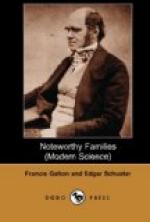The same absence of solid evidence is more or less true of gifted youths whose scholastic successes, unless of the highest order, are a doubtful indication of future power and performance, these depending much on the length of time during which their minds will continue to develop. Only a few of the Subjects of the pedigrees in the following pages have sons in the full maturity of their powers, so it seemed safer to exclude all relatives who were of a lower generation than themselves from the statistical inquiry. This will therefore be confined to the successes of fathers, brothers, grandfathers, uncles, great-uncles, great-grandfathers, and male first cousins.
Only 207 persons out of the 467 who were addressed sent serviceable replies, and these cannot be considered a fair sample of the whole. Abstention might have been due to dislike of publicity, to inertia, or to pure ignorance, none of which would have much affected the values as a sample; but an unquestionably common motive does so seriously—namely, when the person addressed had no noteworthy kinsfolk to write about. On the latter ground the 260 who did not reply would, as a whole, be poorer in noteworthy kinsmen than the 207 who did. The true percentages for the 467 lie between two limits: the upper limit supposes the richness of the 207 to be shared by the 260; the lower limit supposes it to be concentrated in the 207, the remaining 260 being utterly barren of it. Consequently, the upper limit is found by multiplying the number of observations by 100 and dividing by 207, the lower by multiplying by 100 and dividing by 467. These limits are unreasonably wide; I cannot guess which is the more remote from the truth, but it cannot be far removed from their mean values, and this may be accepted as roughly approximate. The observations and conclusions from them are given in Table VII., p. xl.
CHAPTER IX.—MARKED AND UNMARKED DEGREES OF NOTEWORTHINESS.
Persons who are technically “noteworthy” are by no means of equal eminence, some being of the highest distinction, while others barely deserve the title. It is therefore important to ascertain the amount of error to which a statistical discussion is liable that treats everyone who ranks as noteworthy at all on equal terms. The problem resembles a familiar one that relates to methods for electing Parliamentary representatives, such as have been proposed at various times, whether it should be by the coarse method of one man one vote, or through some elaborate arrangement which seems highly preferable at first sight, but may be found on further consideration to lead to much the same results.




